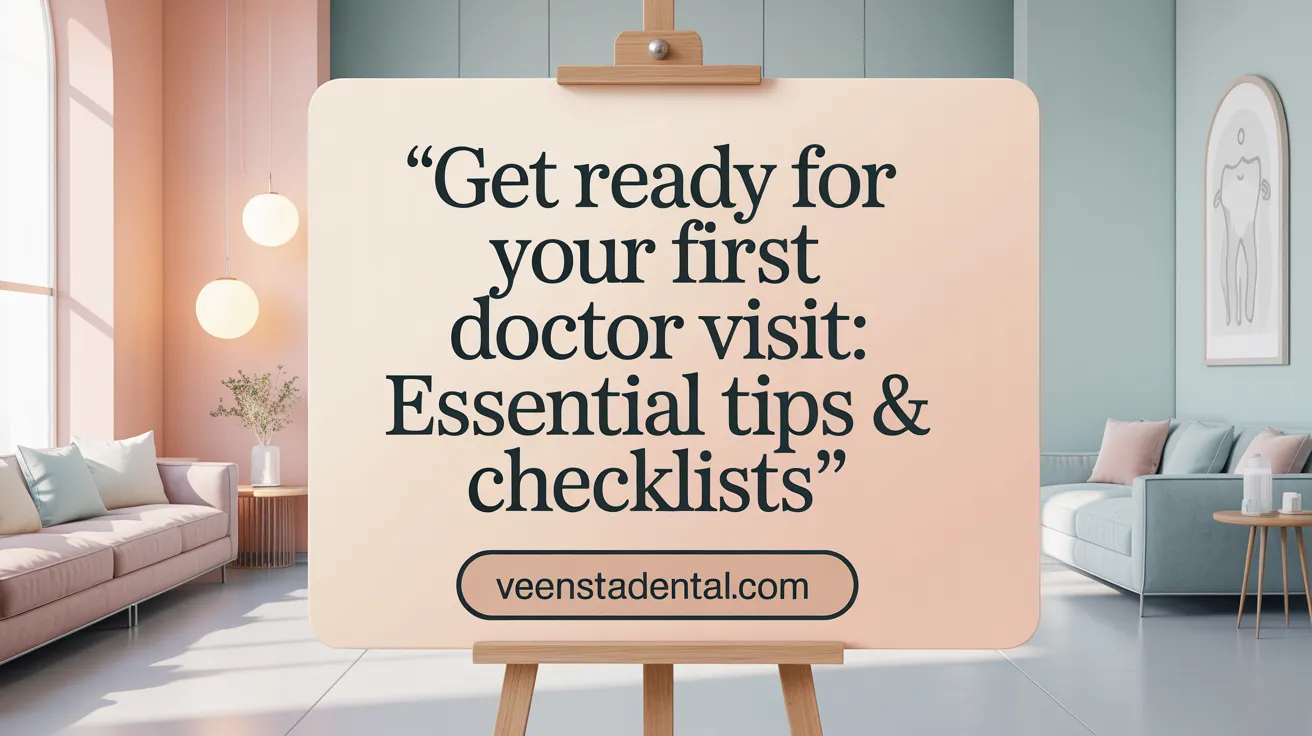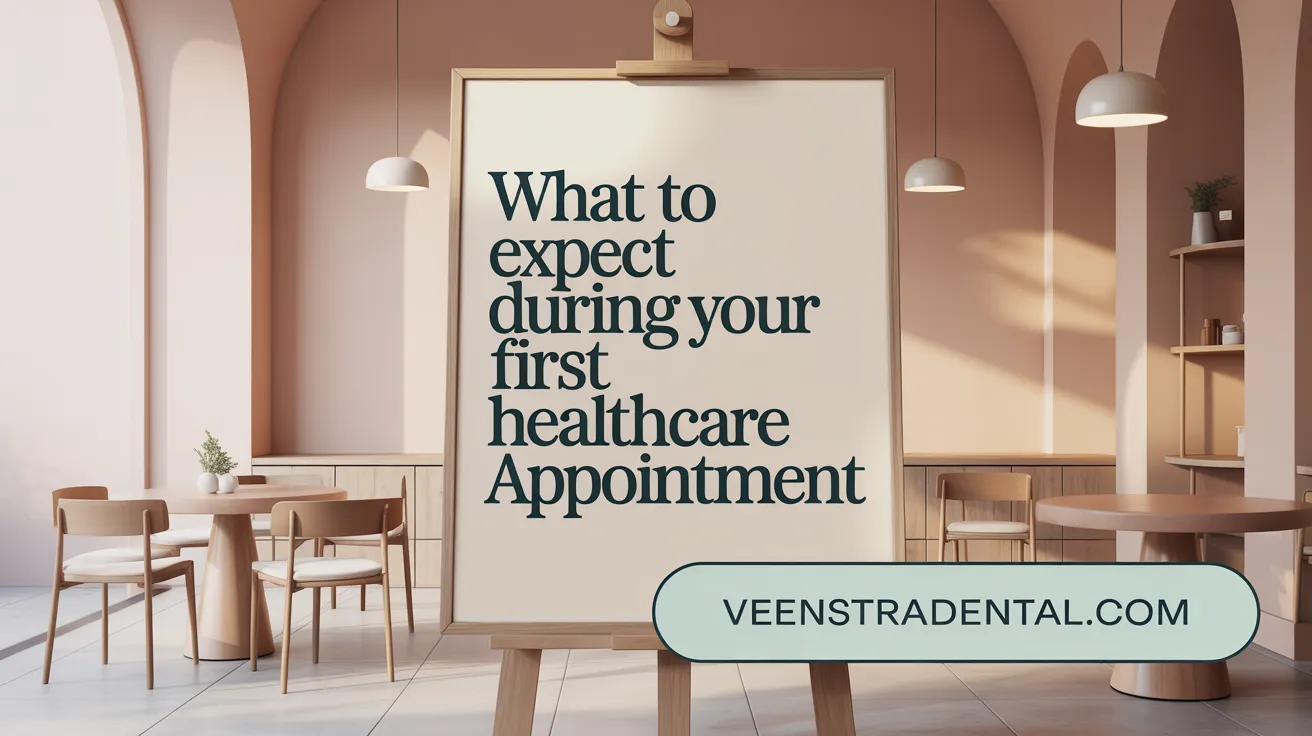Starting Your Healthcare Journey with Confidence
Making your first visit to a new healthcare provider can feel overwhelming, but with the right preparation and knowledge, you can walk into your appointment feeling calm and in control. This guide demystifies what to expect and how to prepare, ensuring your first visit is productive, comfortable, and stress-free.
Preparing for Your First Visit: What to Bring and How to Get Ready

Essential documents for your appointment
Bring your photo ID, insurance card, and any referral documentation if applicable. Having recent medical records, including test results and previous care documents, helps your healthcare provider get a complete picture of your health. For more information on Preparing for a doctor's appointment and Preparing medical records for doctor appointment, see these resources.
Gathering medical and family history
Compile a detailed family health history covering conditions like heart disease, diabetes, and cancer. Also prepare information about your past surgeries, chronic illnesses, and any notable health changes. You can find helpful guidance about Discussing health history with your doctor and Health History to Prepare for Doctor Visit.
Medication and supplement lists
Make a thorough list of all prescribed medications, vitamins, herbal supplements, and dosages. Include any allergies or adverse reactions you have experienced. Check Bringing medication lists to appointments for additional tips.
How to organize your questions and concerns
Write down concerns and symptoms, noting when they occur and what affects them. Prioritize key questions so you cover your most important topics during the visit. Refer to Prioritizing questions for your doctor and Make a List of Questions for Your Doctor to help with preparation.
Arriving early and managing paperwork
Plan to arrive 15-20 minutes early to complete forms or update your medical history. Bringing completed paperwork, if available, speeds up the check-in process. More on this topic can be found in Getting the most from your doctor's visit and Preparing for a Doctor's Visit.
The role of support persons during visits
A friend or family member can provide emotional support, help remember details, and assist with note-taking. Ensure they complement your communication without taking over. See The role of a support person during medical appointments and Tips for First Time Meeting Doctor for more.
Table: Preparation checklist for your visit
| Item | Purpose | Notes |
|---|---|---|
| Photo ID | Verification and check-in | Carry a valid government ID. For details, see Essential documents for your appointment |
| Insurance Card | Coverage details and billing | Have current insurance info. Learn more at Preparing for a doctor's appointment |
| Medication List | Inform treatment decisions | Include dosages and supplements. Guidance available at Bringing medication lists to appointments |
| Medical Records | Comprehensive health background | Include tests and referrals. See Preparing medical records for doctor appointment |
| Family Health History | Risk factor assessment | List major hereditary diseases. Refer to Gathering medical and family history |
| Questions List | Ensure all concerns are addressed | Prioritize topics. For tips, see Make a List of Questions for Your Doctor |
| Support Person (Optional) | Emotional aid and recall assistance | Should support, not overshadow. More info at The role of support persons during visits |
Understanding What Happens During Your Initial Visit

What should I expect during my first visit to a healthcare provider?
Your first visit to a healthcare provider, such as a primary care doctor or a physical therapist, typically lasts between 30 minutes to an hour. This appointment often begins with paperwork and a detailed review of your medical history, including any major illnesses, surgeries, current medications, and family health conditions. The provider will discuss your current symptoms, concerns, and overall lifestyle habits. A physical evaluation is conducted, which may include checking vital signs, assessing posture, flexibility, strength, balance, and pain levels. Depending on your age and health status, the provider might also recommend screenings or diagnostic tests like blood work or imaging. For more details on what to expect, see Primary care providers overview and First Physical Therapy Appointment.
Why is honesty about lifestyle and symptoms important?
Open and honest communication about your habits, such as diet, exercise, smoking, alcohol use, and mental health, is critical. Even sensitive topics like sexual health or emotional wellbeing help your provider form a complete picture of your health. This transparency ensures more accurate diagnoses and enables the provider to tailor treatment plans effectively, improving overall care quality and outcomes. Learn more about Talking to your doctor: 7 things to cover at a new patient visit and Questions to ask before medical appointments.
Additional assessments often included
- Review of allergies and medication side effects
- Discussion of recent health changes or symptoms
- Evaluation of mental health and emotional state
- Screening tests tailored to your individual risk factors
Being prepared to share this information and ask questions will help maximize your first visit and lay the foundation for a productive provider-patient relationship. For tips on Preparing for a doctor's appointment and What to expect during your first visit with a primary care provider, refer to these resources.
Tips to Reduce Anxiety and Stress Before and During Your Visit

Why do patients feel nervous about doctor visits, and how can they manage this?
Feeling nervous or anxious before medical appointments is a common experience. Patients often worry about potential bad news, discomfort or pain during procedures, or simply facing unknown situations. These fears may be heightened by past negative experiences or general anxiety related to health. For more about managing these feelings, see Why am I so nervous for my doctor's appointment?.
To manage these feelings, patients can prepare in advance by writing down questions and concerns they want to address during the visit. Practicing relaxation techniques such as deep breathing or meditation beforehand can also help soothe nerves. Additionally, scheduling appointments at times of the day when the patient generally feels more relaxed can reduce pre-visit stress. For helpful tips, visit Navigating the anxiety of scheduling a medical appointment.
How can I calm myself during a medical appointment?
During the appointment, focusing on your breath using methods like the 4-7-8 breathing technique can activate the body's relaxation response. Mindfulness meditation—bringing attention to the present moment without judgment—along with sensory grounding exercises (such as the 5-4-3-2-1 technique that engages all five senses) are effective ways to stay calm. See Six relaxation techniques to reduce stress for detailed methods.
Listening to calming music or nature sounds may further ease anxiety. Bringing a trusted friend or family member not only offers emotional support but also helps to remember important information and questions. More advice is available at Stress-free doctor's appointment.
Additional strategies to ease anxiety and stress
- Bring a support person: Having someone accompany you can provide emotional reassurance and assist in communicating with your healthcare provider. See Tips for effective doctor communication.
- Communicate openly: Sharing your anxieties with your provider allows them to tailor their approach, explain procedures clearly, and ensure your comfort. Guidance on this is available at Afraid to visit the doctor?.
- Prepare questions: Lists help keep focus during the appointment and ensure all concerns are addressed, reducing uncertainty. For help preparing questions, see Prepare for Doctor Visits and 7 things you can do to prepare your next doctor appointment.
- Schedule wisely: Choose appointment slots when you typically feel calm and can avoid rushing to lower stress. Strategies can be found at 7 ways to make travel less stressful and How to stay calm before a doctor's appointment.
By combining these tactics—preparation, relaxation, support, scheduling, and communication—you can significantly reduce anxiety and create a more positive medical appointment experience. For comprehensive stress management techniques, visit Stress Management and Emotional Health and Tips to reduce stress.
Navigating Insurance, Costs, and Financial Concerns in Your First Visit

What should I know about insurance and payment during my first visit?
Insurance verification is an important step prior to your appointment to ensure coverage details are clear. You should bring your insurance card and any relevant documents to your visit. Understanding financial terms such as deductible, co-payment, and co-insurance helps you anticipate your share of medical costs. Clinics often accept major insurance plans and may offer interest-free payment plans or financial hardship discounts for patients facing difficulties. For more details, see New Patient FAQs.
Are there fees related to missed or late appointments?
Many medical providers require at least 24 hours' cancellation notice to avoid penalties. If you miss an appointment or cancel late without sufficient notice, you may be charged a fee. Prompt communication with the clinic when you cannot attend safeguards you from unexpected costs and helps the practice use the appointment slot efficiently. For more information, review New Patient FAQs.
Important considerations for new patients:
- Verify your insurance coverage and confirm accepted plans.
- Carry your insurance card and payment method.
- Ask the clinic about billing procedures and possible out-of-pocket costs.
- Inquire about payment plans to spread costs if needed.
- Understand cancellation policies to avoid fees.
Learn more about these points in Preparing for Your First Visit and New Patient FAQs.
How billing works post-appointment
After your visit, you will typically receive a detailed medical statement outlining services and associated costs. Payments like co-pays are usually collected during the visit, while charges beyond that may be billed later with clear instructions for payment or assistance options. Additional information can be found at New Patient FAQs and Doctor Appointment Preparation.
Staying informed about your insurance and financial obligations before and after your first visit allows for a smoother healthcare experience and less stress about costs. For guidance, see Preparing for a Doctor's Appointment.
Maximizing Your Appointment: Ensuring Clear Communication and Follow-Up

How can I make sure I understand my healthcare provider during the visit?
Taking notes during your appointment is a simple yet powerful tool to improve understanding. Writing down explanations, instructions, and key points helps you remember important details and prevents confusion later. Always feel comfortable asking your provider to explain medical terms, the purpose of tests, or treatment plans in simpler language. For more tips on how to take notes during doctor's visits, you can refer to detailed guides.
Requesting a summary or a recap before you leave can further ensure clarity. You can also ask for written instructions, which are especially helpful if your visit involves multiple steps or new medications. Learn more about requesting recap and follow-up instructions.
What should I do after my appointment?
Before leaving, schedule any follow-up appointments or tests recommended by your healthcare provider. This helps maintain continuity of care and ensures you stay on track with your health plan. Resources on ensuring continuity of care offer helpful suggestions.
Keep a close eye on your symptoms and any new changes. If you notice side effects or worsening conditions, reach out to your provider promptly. Clarify any uncertainties about test results or treatment during your follow-up communications. Guidance on when to contact your healthcare provider can help you decide.
Utilizing Patient Portals for Ongoing Communication
Many healthcare offices offer patient portals, online platforms where you can view test results, message your provider, request prescription refills, and schedule appointments. Utilizing these tools can strengthen your engagement and provide convenient access to your health information. For more about viewing test results online and scheduling appointments, see related resources.
Knowing When to Contact Your Healthcare Provider
Contact your provider if you experience new symptoms, adverse side effects, or have questions about your care plan. Timely communication helps address issues early and supports better health outcomes. To better understand how and when to contact your healthcare provider, consult available materials.
Following these steps ensures you maximize the value of your medical appointments, fostering clear communication and effective follow-up care. For comprehensive strategies on tips for effective doctor communication, you can explore additional guides.
Confidence for Your Healthcare Journey Ahead
Being a new patient can feel daunting, but careful preparation, open communication, and knowledge of what to expect transform the visit into a positive experience. Remember to bring necessary documents, prepare questions, manage anxiety with relaxation techniques, understand your insurance responsibilities, and engage fully during your appointment. With these tools, you are set for a smooth, productive, and reassuring first visit — the foundation of a strong, ongoing partnership with your healthcare provider.
